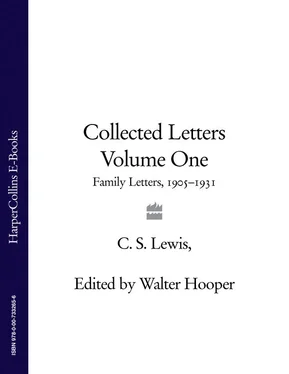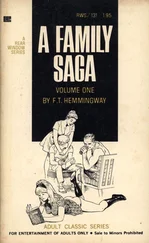Or, in other words, ‘The Roots of the Mountains’ is the chief cause of my silence. It is not, however, in spite of all this, nearly so good as the first volume of ‘The Well at the World’s End’, although the interest is better sustained throughout. To begin with, I was desparately dissapointed to find that there is nothing, supernatural, faery or unearthly in it at all: in fact, it is more like an ordinary novel. And yet there are many compensations: for, tho’ more ordinary than the ‘Well’, it is still utterly different from any novel you ever read. Apart from the quaint and beautiful old English, which means so much to me, the supernatural element, tho’ it does not enter into the plot, yet hovers on the margin all the time: we have ‘the wildwood wherein dwell wights that love not men, to whom the groan of the children of men is as the scrape of a fiddle-bow: there too abide the kelpies, and the ghosts of them that rest not’, 51 and such delightful names as The Dusky Men, The Shadowy Vale, The Shivering Flood, The Weltering Water etc. Another thing I like about it is that the characters are not mediaeval knights but Norse mountain tribes with axe & long-sword instead of horses & lances and so forth. However, though it is worth having and well worth reading, I don’t know if its really worth buying. The next time I get a Morris Romance it will be one of the later ones, as the ‘Roots’ is one of the first, when, apparently, he hadn’t yet found his feet in prose work.
On Saturday last we were over at a little village near here, where Watts the painter lived: 52 there is a little gallery, a lovely building, designed by himself, containing some of his quite famous pictures like ‘Orpheus & Euridyce’, ‘Endymion’, ‘Sir Galahad’ etc, which I always thought were in the Louvre or the Tate or some such place. Of course I don’t really quite understand good painting, but I did my best, and succeeded in really enjoying some myself, & persuading the other people that I knew a tremendous lot about them all.
What a grand dialectician, our Little Arthur is!! 53 You reply to my elegant tirade against sentiment by stating your old thesis that it ought not to be suppressed, without a single reason. You don’t admit my arguments, and yet make no endeavour to answer them. And because I choose trousers for an example you say that it is ‘very funny’. Moi, I didn’t know trousers were funny. If you do, I picture your progress from the tram to the office something thus: ‘Hullo! Good lord, there’s a fellow with trousers over there! And there’s another. Ha-Ha–Oh this is too screaming. Look–one-two-three more–’ and you collapse in a fit of uncontrollable merriment. Doesn’t this sort of truck fill up the paper? But in point of fact, I’ve lost your last letter, and so don’t quite know what to talk about.
Thanks for carrying out my message to Miss Whatdoyoucallher? about the monthly catalogues, which are now arriving in due order. That’s rather a pretty girl, the H.M.V. infant prodigy 18 year old soprano, but she doesn’t seem to sing anything worth hearing. Hear your brethren are going to join a friend’s ambulance corps, whatever that may be. Give them my congratulations and all the usual nonsense one ought to say on such an occasion. I hope they will get on famously and come back with Victoria crosses and eye-glasses, which seem to be the two goals of military ambition.
It is hot as our future home down below, here, but the country is looking delightful, & I have found one or two more SOAKING MACHINES (I will use that word if I want to) and so am quite comfortable. I hear you have taken to getting heart fits in the middle of the sermon at Saint Marks and coming out–I only wish you’d teach me the trick.
And now, the kind reader, if there still is one, is going to be left in peace. Do write soon, and forgive your suppliant
Jack
TO HIS FATHER (LP IV: 313-14):
[Gastons]
Postmark: 25 May 1915
Dear Papy,
I don’t seem to have heard from you for some time now, but I suppose I am a little behindhand myself. There has been great excitement here this week end: when I came home from Church on Sunday morning I found a note waiting for me to say that Kirk and Mrs. Kirk had gone to Bristol where they had heard by a telegraph that Louis was in hospital. It appears he got a mild species of sun stroke while working with big guns down there at a place called Lydd. It was not very serious–in fact I gather somewhat of a mares nest–and K. is back this evening while Mrs. K. is staying at Bristol for a few days.
We have started our real summer here, and it is pretty warm. How does the weather suit the home farm, where I hope the tragic gardeners are in good form? What between pigeons and gardeners and white Homburg hats, Leeborough must present quite a seasonable spring idyll (with a double ‘l’.)
Mrs. K. and I were over at a place called Compton beyond Guildford on Saturday, where the attraction is a little pottery for fancy tiles and sich, founded by my friend William [Morris], who, as you know, besides being a poet was a wall paper designer, a potter, a hand loom weaver and everything else you can think of. Nearby is a gallery of Watts’s pictures. He, it appears, was one of that same set, and there are a lot of quite swell things there, such as his ‘Paolo and Francesco’, ‘Orpheus and Euridyce’, and ‘Found Drowned’ etc., which I always imagined to be in some big place like the Louvre or Tate. It was quite interesting.
Any news from the Colonel lately? I have not heard from any one except Arthur for a long time now, so do try and raise a letter soon. Or is this silence a result of a literal obedience to my last advice a propos of lectures to the members of the Select Vestry? I hope the doctors don’t think it serious.
There are plenty of nightingales about now, and in fact they are rather a nuisance. I am afraid this is rather a scrappy letter, but I am writing rather late at night, just before going to bed, and am a bit sleepy. I should like to know what is going on at Leeborough just now. I suppose these are the days of no fires, and sunset on the seat behind the laurels, with the crows coming home overhead, and Tim on the look out for wasps.
I hope you are keeping well and cheerful. Write again soon.
your loving,
son,
Jack
TO HIS FATHER (LP IV: 322-3):
[Gastons
28? May 1915]
My dear Papy,
I am sorry to hear that the mental digestion of my parent is so weak, and blame myself for giving it such strong meat. Perhaps a course of ‘Decalettes, pure and simple things’, or nursery rhymes would meet the case. (Now we can proceed to the letter.)
Of course it is a very good thing that Bernagh is contributing to the forces, but one cannot help thinking that a better choice than the ‘Friend’s Ambulance Corps’–which really does sound rather sleepy–might have been made. 54 However, I suppose ‘those also serve’ 55 though the trenches impress the outside spectator more than an ambulance corps. A propos of conscription, I sincerely hope that one of two things may happen. Either that the war may be over before I am eighteen, or that conscription may not come into force before I have volunteered. I shouldn’t fancy going out to meet the others–as a conscript. I see the Daily Mail is being burnt everywhere for advocating the plan. 56 How excellent a proof of the necessity of a petty little plan like sending an envelope full of ashes–or most likely it was a woman. There is absolutely no news here, and the weather is very hot. Mrs. K. has now returned again from Bristol where she left Louis getting on all right.
I like your garden picture. I can imagine the whole scene, and especially the conversation with the Greeve’s on the road, we have heard so many like it before. The country at home must be looking delightful now, and I wish I could see it, but most of all the sea. If Bookham were not so far inland it would be delightful too–and indeed to do it justice it is very pretty. The remark about the fates is excellent from a literary point of view, only I don’t like to think of you thinking those sort of things in such a place–and with a white Homburg hat too. And yet I remember that Swinburne has some remark about the impossibility of changing ‘wings for feet, or feet for wings’. I suppose if we Lewis’s are made in that mould of reflective gravity which troubles deepen into melancholy, it is the price which we pay for a thoughtful and feeling mind. About the question of retrospect and anticipation (dangerous word for you, sir), there is a sentence in one of W. Morris’s prose tales that I am reading at present, which tho’ perhaps not strictly in point, is yet well worth remembering in its archaic charm and quaint nobility:–‘Thus then lived this folk in much plenty and ease of life, though not delicately nor desiring things out of measure. They wrought with their hands and wearied themselves: they rested from their toil and feasted and were merry: tomorrow was not a burden unto them, nor yesterday a thing that they would fain forget: life shamed them not, nor did death make them afraid.’ 57 There is another way of looking at life: impossible it may be in a sophisticated age, and yet I think he would be a happy man who could do so.
Читать дальше












